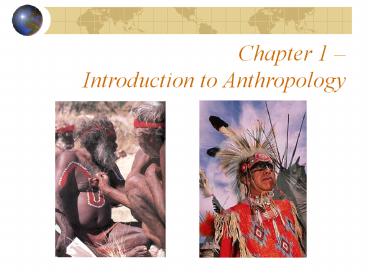Chapter 1 - PowerPoint PPT Presentation
Title:
Chapter 1
Description:
Chapter 1 Introduction to Anthropology What is anthropology? Anthropology is the systematic study of humankind. - man ... – PowerPoint PPT presentation
Number of Views:128
Avg rating:3.0/5.0
Title: Chapter 1
1
Chapter 1 Introduction to Anthropology
2
What is anthropology?
- Anthropology is the systematic study of
humankind. - ???????? - man
- ????? - word/study
- Emergence of the discipline
- Two major goals
- Understand uniqueness and diversity
- Discover fundamental similarities
3
Four-field Approach
- Four subdisciplines bridge science and
humanities - Physical Anthropology
- Archaeology
- Linguistics
- Cultural Anthropology
4
Physical Anthropology
- Primarily concerned with humans as a biological
species - Most closely related to natural sciences
- Major research areas
- Human evolution
- Modern human variation
- Subdisciplines
- Palaeoanthropology, primatology, forensics,
genetics
5
(No Transcript)
6
Archaeology
- Archaeologists seek out and examine the artifacts
(material products) of past societies. - Archaeology is not treasure-hunting (a la Indiana
Jones). - Subdisciplines of archaeology
- Prehistoric, historic, Classical, Biblical,
underwater - Modern trash
7
Linguistic Anthropology
- Subfield of anthropology, philosophy, and English
- Main research areas
- How language is used
- Relationship between language and culture
- How humans acquire language
- Fields of linguistics
- Structural, historical, sociolinguistics
8
(No Transcript)
9
Cultural Anthropology
- Sometimes known as ethnology, cultural
anthropology examines contemporary societies and
cultures throughout the world. - Participant observation
- Ethnography
- Ethnographic data
10
(No Transcript)
11
Holism and Applied Anthropology
- Training in all four fields required
- Links to other social sciences
- Sociology, psychology, economics, political
science, history - Applied Anthropology
- Sometimes called the 5th field
- Offers practical solutions to cultural problems
12
Great Britain - 1966
13
Guinea Bissau, Africa
14
The Americas
15
The Netherlands
16
Italy
17
Tibet, 1997
18
Mexico - November 1
19
U.S. - Virginia, 2000
20
Cultural Relativism
- The values of one culture should not be used as
standards to evaluate the behavior of persons
from outside that culture a societys custom and
beliefs should by described objectively. - Modern approach We should strive for objectivity
and not be too quick to judge however, there are
some moral absolutes that are removed from
culture. - Discussion
- Examples of moral absolutes?
21
Introduction to Sociology
22
Sociology defined and explained
Question What is Sociology? Answer
The Scientific study of human societies and
social behavior.
23
A Systematic Approach
Q Is it a science? A Yes, sociologists begin
their work by proposing questions of importance
to them and then designing a research project
that will enable them to ascertain the answers to
their major research questions. Q Is it
organized? A Yes, sociological investigations
proceed systematically. As a social science ,
sociology is a discipline that is organized and
methodical and its endeavors are undertaken for
the purpose of enhancing knowledge.
24
Defining the Sociological Perspective
- Sociology is the scientific study of human
society and social interactions. - What makes sociology scientific?
Personal experience Awareness of
friends Systematic study with
drug use and associates
patterns of a random
of drug
use sample of drug
users
Levels of Understanding Drug Use
25
Sociology and Common Sense
- Common sense assumptions are usually based on
very limited observation. - Moreover, the premises on which common sense
assumptions are seldom examined. - Sociology seeks to
- use a broad range of carefully selected
observations and - theoretically understand and explain those
observations. - While sociological research might confirm common
sense observation, its broader base and
theoretical rational provide a stronger basis for
conclusions.
26
I am not an Animal!!!
Sociologists examine groups of humans in an
effort to understand the nature, meaning and
significance of human group relationships.
NOTE Sociologists are not interested in
animal species.
27
Social behavior
- Sociologists examine the following
- What people do that affect others around them.
- things that people do after they have given
thought to how others might respond to their
acts, especially when the people are aggregated
into groups.
28
The least we need to know
- Sociology seeks to understand how groups work,
how groups influence one another, and how groups
influence the things that individuals do.
29
Sociology vs. Anthropology
One branch of anthropology (cultural) shares
an interest with sociology in its focus on
cultural issues. The other branches, archaeology
and physical anthropology are different in their
study of relics and skeletal remains to
understand peoples of the past.
30
Sociology vs. Psychology
Psychology attempts to explain why individuals
act, or how individuals influence others
behavior. Remember, sociology attempts to
explain how and why groups act or how groups
influence individuals behaviors.
31
Sources
- Introduction to Anthropology
- http//www.killgrove.org/ANT220/jan15.ppt
- Introduction to Anthropology
- http//www.socanth.uncc.edu/crobb/1introlect1.ppt
- Introduction to Anthropology
- http//www.wmrfh.org/rbaker/The20Four20Fields.p
pt - Introduction to Sociology
- http//www.imperial.edu/Media/19-SOC1CH1.ppt
- Introduction to Sociology http//www.aui.ma/person
al/B.Cox/material/ISCh01r.ppt
32
(No Transcript)
33
(No Transcript)

